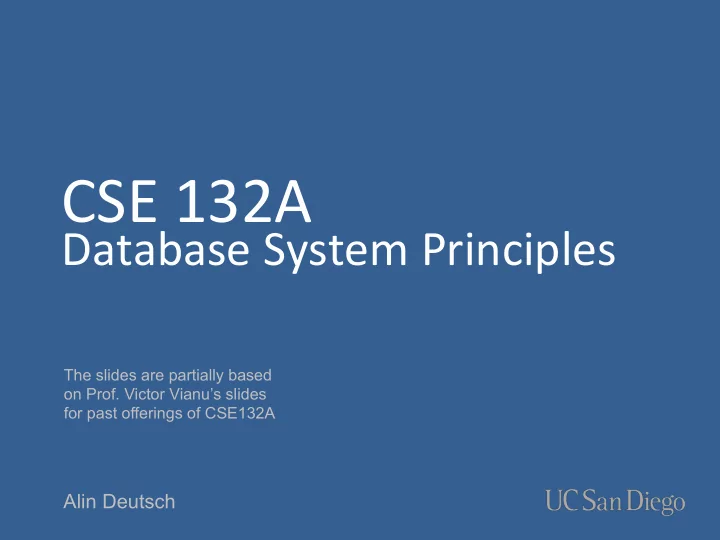

CSE 132A Database System Principles The slides are partially based on Prof. Victor Vianu’s slides for past offerings of CSE132A Alin Deutsch
introduction
“Databases” What comes to your mind? 3
Data. Why data? • Data play already an important role in our lives 4
Data in everyday life Let’s go have some coffee! Z Z Z Stores Find coffee shop Reviews Yelp Maps Traffic Maps 5
Data in everyday life Let’s go have some coffee! Z Z Z Inventory Order coffee Sales Coffee House Accounts Bank Statistics Fraud Detection 6
Data in everyday life Let’s go have some coffee! Check facebook Profile Facebook 7
Data. Why data? • Data play already an important role in our lives … • … and computer science is becoming more and more data-centric 8
Data in Computer Science • Web knowledge harvesting • Crowd sourcing • Cloud computing • Scientific databases • Networks • Streaming sensor monitoring • Social networks • Geographic information systems • Big data … 9
Big Data in the news Wired Gigaom The Wall Street Journal To launch the initiative, six The White House Federal departments and agencies will announce The White House more than $200 million in new commitments… Forbes The White House 10
How to manage data? • Store data • Query/retrieve data • Update data This class: Learn basic concepts behind data management systems 11
Database System • Tailored to a particular application Very time-consuming to design, implement and optimize 12
Database Management System • A generalized database system • Used in a variety of application environments • Provides common approach to: Data organization Data storage Data access Data control • Examples: Ingres/PostgreSQL, DB2, Oracle, SQL Server, MySQL, etc Leverage years of research gone into the design of the DBMS 13
History of Database Systems 1950 - early 1960s • Data processing based on magnetic tapes Magnetic tapes for data storage Punched cards for data input • Need to process data in specific order Magnetic tapes allow only sequential order to data 14
History late 1960s - 1970s • Advent of disks No need for sequential processing Design of data structures for data storage and processing • Relational model Proposed by Codd (who won the Turing Award for his work) Non-procedural way of querying data 15
History 1980s • Research relational prototypes … System R (by IBM Research) Ingres (by UC Berkeley) • … lead to commercial relational systems IBM DB2, Oracle, Ingres, DEC Rdb 16
History 1990s • The WWW era • New requirements for DBMSs High availability Support for web interfaces to data • From transaction (update-intensive) processing to query-intensive applications (decision support and data mining) 17
History 2000s - 2010s • XML & XQuery standards • Automated DB administration Auto-admin • Open-source DBMSs PostgreSQL, MySQL • Specialized DBMSs for big data management Column stores, highly parallel DBMSs, NoSQL • Tremendous expansion across computer science 18
class info
Goal of the class • Learn basic principles of database management systems (DBMSs) with an emphasis on the relational model • Get hand-on experience using a real DBMS through programming assignments • Acquire the necessary background for follow-up database courses CSE 132B: Database System Applications CSE 135: Online Analytics Applications 20
Content • Database Management System Overview • Relational databases The relational model Commercial query languages: SQL (& QBE) Formal query languages: relational algebra & calculus Indexing (sequential files, B-trees) Schema design: normal forms & E-R model • Other topics as time allows Column Store, MapReduce, NoSQL 21
Course Composition Tentative (to be adjusted based on time allowance): • Programming Assignments (SQL + JDBC): 30% • Homeworks: 25% • Midterm: 15% • Final: 30% 22
Textbook • Main textbook (recommended, not required): "Database System Concepts” by Silberschatz, Korth and Sudarshan, 6th Edition • Alternative textbook: "Database Systems: The Complete Book” by H. Garcia-Molina, J.Ullman and J. Widom, Prentice Hall • For those interested in database theory: "Foundations of Databases” by S.Abiteboul, R.Hull and V.Vianu, Addison-Wesley, 1995 23
Other resources • Class web-site http://cseweb.ucsd.edu/classes/fa19/cse132A-a • Piazza discussion forum https://piazza.com/ucsd/fall2019/cse132a Announcements will be made to piazza. Check both daily for updates! 24
Course Policies • No plagiarism! • Re-grade Request at TA within 1 week from the day of return • Makeups or extensions only in true hardship cases Contact me as soon as possible • E-mail Prefer office hours & Piazza. If you use it, conciseness is a virtue! Read policies on the course web-site! Contact me for questions. 25
Databases@UCSanDiego • Database group Prof. Alin Deutsch Prof. Arun Kumar Prof. Yannis Papakonstantinou Prof. Victor Vianu • Group web-site http://db.ucsd.edu • Interested in database research? Contact any of us! 26
Recommend
More recommend